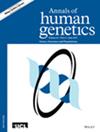Spinocerebellar ataxia type 10 and Huntington disease-like 2 in Venezuela: Further evidence of two different ancestral founder effects
Abstract
Introduction
The American continent populations have a wide genetic diversity, as a product of the admixture of three ethnic groups: Amerindian, European, and African Sub-Saharan. Spinocerebellar ataxia type 10 (SCA10) and Huntington disease-like 2 (HDL2) have very ancient ancestral origins but are restricted to two populations: Amerindian and African Sub-Saharan, respectively. This study aimed to investigate the genetic epidemiological features of these diseases in Venezuela.
Methods
In-phase haplotypes with the expanded alleles were established in seven unrelated index cases diagnosed with SCA10 and in 11 unrelated index cases diagnosed with HDL2. The origins of remote ancestors were recorded.
Results
The geographic origin of the ancestors showed grouping in clusters. SCA10 had a minimal general prevalence of 1:256,174 families in the country, but within the identified geographic clusters, the prevalence ranged from 5 per 100,000 to 43 per 100,000 families. HDL2 had a general prevalence of 1:163,016 families, however, within the clusters, the prevalence ranged from 31 per 100,000 to 60 per 100,000 families. The locus-specific haplotype shared by all families worldwide, including the Venezuelans, supports a single old ancestral origin in each case.
Conclusion
Knowing the genetic ancestry and geographic origins of patients in Ibero-American mixed populations could have significant diagnostic implications; thus, both diseases in Venezuela should always be first explored in patients with a suggestive phenotype and ancestors coming from the same known geographic clusters.

 求助内容:
求助内容: 应助结果提醒方式:
应助结果提醒方式:


